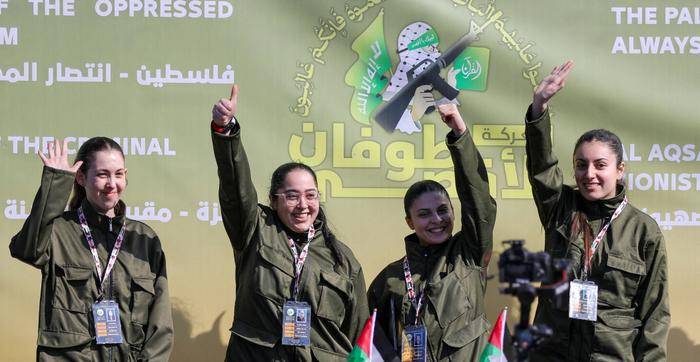Four Israeli Hostages Freed in Gaza After 477 Days in Captivity
In a dramatic and emotional scene, four Israeli hostages were released in Gaza on Saturday, January 25, 2025, after being held captive by Hamas for 477 days. The release was part of a fragile ceasefire agreement between Israel and Hamas, which has brought a temporary halt to the violence that has ravaged the region.
The four hostages, Karina Ariev, Daniella Gilboa, Naama Levy, and Liri Albag, were abducted by Hamas militants during the devastating October 7 attack on the Nahal Oz military base, which claimed the lives of over 1,400 people. The women, all in their early 20s, were paraded in Gaza City in a heavily orchestrated display by Hamas, before being handed over to the Red Cross and eventually reunited with their families in Israel ¹.
The release of the hostages was met with a mix of emotions, ranging from joy and relief to anger and frustration. The families of the hostages, who had been campaigning tirelessly for their release, were overjoyed to be reunited with their loved ones. However, many Israelis were critical of the government's decision to release Palestinian prisoners, including convicted terrorists, in exchange for the hostages.
The stories of the four hostages are a poignant reminder of the human cost of war. Liri Albag, an aspiring architect, was just 19 when she was abducted. Her family had been searching for her everywhere, only to discover a Hamas video showing her abduction ². Karina Ariev, a psychology student, was known for her compassion and love of dancing and writing. Her family had been left with only a few brief phone calls and a harrowing video showing her capture ².
Daniella Gilboa, a talented musician, had been dreaming of a professional career in piano and singing before her abduction. Her family had identified her in a Hamas video by her shirt and ponytail ². Naama Levy, a triathlete and peace activist, was captured in a brutal scene that was captured on video. Her family had been left with only a few glimpses of her during her captivity ².
The release of the hostages was made possible by a fragile 42-day ceasefire agreement between Israel and Hamas. The agreement, which was brokered by Egyptian and Qatari mediators, has brought a temporary halt to the violence that has ravaged the region. However, many experts warn that the ceasefire is fragile and could collapse at any moment.
The agreement has also been criticized for its lack of transparency and accountability. Many Israelis are angry that the government has agreed to release Palestinian prisoners, including convicted terrorists, in exchange for the hostages. Others are critical of the government's decision to negotiate with Hamas, which is considered a terrorist organization by many countries.
The release of the hostages is just the beginning of a long and difficult road to recovery. The women will require extensive medical and psychological treatment to deal with the trauma they experienced during their captivity. They will also need to rebuild their lives and reintegrate into Israeli society.
The release of the hostages is a poignant reminder of the human cost of war and the importance of working towards a lasting peace. It is a reminder that even in the midst of conflict and violence, there is always hope for a better future.




No comments yet
Be the first to share your thoughts!